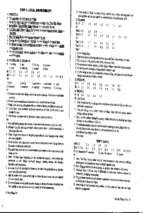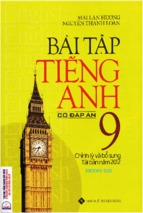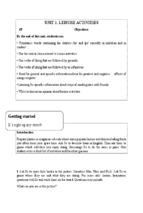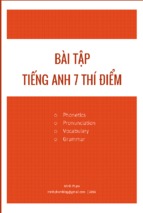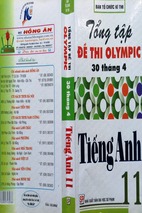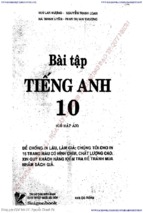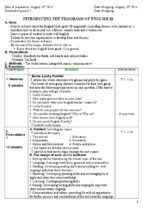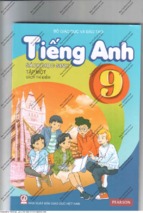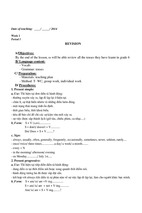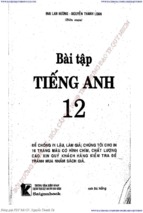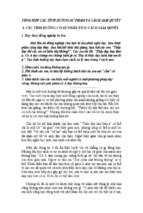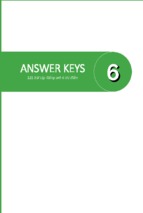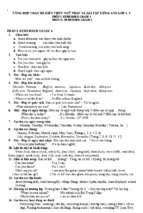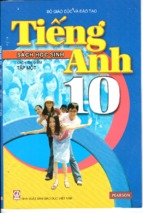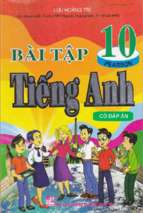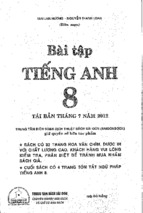NỘI DUNG ÔN TẬP KIẾN THỨC NGÔN NGỮ CƠ BẢN
TIẾNG ANH 12
THÌ ĐỘNG TỪ:
I- Hieän taïi ñôn (Simple Present):
1) Caùch thaønh laäp:
- Caâu khaúng ñònh: S + V(s/es);
S + am/is/are
- Caâu phuû ñònh:
S + do/does + not + V;
S + am/is/are + not
- Caâu hoûi:
Do/Does + S + V … ?
Am/Is/Are + S …?
2) Caùch duøng chính: Thì hieän taïi ñôn ñöôïc duøng ñeå dieãn taû:
2.1 Moät thoùi quen, moät haønh ñoäng ñöôïc laëp ñi laëp laïi thöôøng xuyeân. Trong caâu thöôøng coù
caùc traïng töø: always, often, usually, sometimes, seldom, rarely, every day/week/month …
Ex: Mary often gets up early in the morning.
2.2 Moät söï thaät luùc naøo cuõng ñuùng, moät chaân lyù.
Ex: The sun rises in the east and sets in the west.
2.3 Moät haønh ñoäng trong töông lai ñaõ ñöôïc ñöa vaøo chöông trình,keá hoaïch.
Ex: The last train leaves at 4.45.
II- Hieän taïi tieáp dieãn (Present Continuous):
1) Caùch thaønh laäp:
- Caâu khaúng ñònh S + am/is/are + V-ing
- Caâu phuû ñònh
S + am/is/are + not + V-ing
- Caâu hoûi: Am/Is/Are + S + V-ing … ?
2) Caùch duøng chính: Thì hieän taïi tieáp dieãn duøng ñeå dieãn taû:
2.1 Moät haønh ñoäng ñang dieãn ra ôû hieän taïi (trong luùc noùi); sau caâu meänh leänh, ñeà nghò.
Trong caâu thöôøng coù caùc traïng töø: now, right now, at the moment, at present, …
Ex: - What are you doing at the moment?
- I’m writing a letter.
- Be quiet! My mother is sleeping.
- Look! The bus is coming.
2.2 Moät haønh ñoäng ñaõ ñöôïc leân keá hoaïch thöïc hieän trong töông lai gaàn.
Ex: - What are you doing tonight?
- I am going to the cinema with my father.
2.3 Moät haønh ñoäng nhaát thôøi khoâng keùo daøi laâu, thöôøng duøng vôùi today, this week, this
month, these days, …
Ex: - What is your daughter doing these days?
- She is studying English at the foreign language center.
3) Nhöõng ñoäng töø khoâng ñöôïc duøng ôû thì HTTD:
3.1 Ñoäng töø chæ giaùc quan: hear, see, smell, taste
3.2 Ñoäng töø chæ tình caûm, caûm xuùc: love, hate, like, dislike, want, wish
3.3 Ñoäng töø chæ traïng thaùi, söï lieân heä, sôû höõu: look, seem, appear, have, own, belong to, need, …
3.4 Ñoäng töø chæ sinh hoaït trí tueä: agree, understand, remember, know, …
III- Hieän taïi hoaøn thaønh (Present Perfect):
1) Caùch thaønh laäp:
1
- Caâu khaúng ñònh S + have/has+ V3/ed
- Caâu phuû ñònh
S + have/has + not + V3/ed
- Caâu hoûi: Have/Has + S + V3/ed … ?
2) Caùch duøng chính: Thì HTHT duøng ñeå dieãn taû:
2.1 Moät haønh ñoäng xaûy ra trong quaù khöù khoâng xaùc ñònh roõ thôøi ñieåm.
Ex: Have you had breakfast? – No, I haven’t.
2.2 Moät haønh ñoäng xaûy ra trong quaù khöù, coøn keùo daøi ñeán hieän taïi. (Ñi với since hoặc for)
Ex: My friend Nam has lived in HCMC since 1998.
2.3 Moät haønh ñoäng vöøa môùi xaûy ra hoặc xảy ra gần so với hiện tại. (Thường có: just,
recently, lately…)
Ex: I have just finished my homework.
2.4 Trong caáu truùc:
Be + the first/second… time + S + have/has + V3/ed
Be + the ss nhaát + N + S + have/has + V3/ed
Ex: This is the first time I have been to Paris.
She is the most honest person I have ever met.
3) Caùc traïng töø thöôøng duøng vôùi thì HTHT: just (vöøa môùi), recently/lately (gaàn ñaây), ever (ñaõ
töøng), never (chöa bao giôø), yet (chöa), already (roài), since (töø khi – moác thôøi gian), for
(khoaûng), so far/until now/up to now/up to the present (cho ñeán baây giôø).
IV- Hieän taïi hoaøn thaønh tieáp dieãn (Present Perfect Continuous):
1) Caùch thaønh laäp:
- Caâu khaúng ñònh S + have/has+ been + V-ing
- Caâu phuû ñònh
S + have/has + not + been + V-ing
- Caâu hoûi
Have/Has + S + been + V-ing … ?
2) Caùch duøng chính: Thì HTHTTD duøng ñeå dieãn taû: Haønh ñoäng baét ñaàu trong quaù khöù, keùo daøi
lieân tuïc ñeán hieän taïi vaø coøn tieáp dieãn ñeán töông lai, thöôøng ñi vôùi How long, since vaø for.
Ex: - How long have you been waiting for her?
- I have been waiting for her for an hour.
* HTHT: haønh ñoäng hoaøn taát
> < HTHTTD: haønh ñoäng coøn tieáp tuïc
V- Quaù khöù ñôn (Simple Past):
1) Caùch thaønh laäp:
- Caâu khaúng ñònh S + V2/ed;
S + was/were
- Caâu phuû ñònh
S + did + not + V;
S + was/were + not
- Caâu hoûi
Did + S + V … ?;
Was/Were + S … ?
2) Caùch duøng chính: Thì QKÑ duøng ñeå dieãn taû haønh ñoäng ñaõ xaûy ra vaø hoaøn taát trong quaù khöù vôùi
thôøi gian ñöôïc xaùc ñònh roõ. Caùc traïng töø thöôøng ñi keøm: yesterday, ago, last week/month/year, in
the past, in 1990, …
Ex: Uncle Ho passed away in 1969.
VI- Quaù khöù tieáp dieãn (Past Continuous):
1) Caùch thaønh laäp:
- Caâu khaúng ñònh S + was/were + V-ing
- Caâu phuû ñònh
S + was/were + not + V-ing
2) Caùch duøng chính: Thì QKTD duøng ñeå dieãn taû:
- Caâu hoûi: Was/Were + S + V-ing … ?
2
2.1 Moät haønh ñoäng ñang xaûy ra vaøo moät thôøi ñieåm xaùc ñònh trong quaù khöù.
Ex: - She was studying her lesson at 7 last night.
- What were you doing from 3pm to 6pm yesterday?
- I was practising English at that time.
2.2 Moät haønh ñoäng ñang xaûy ra ôû quaù khöù (Were/Was + V-ing) thì coù moät haønh ñoäng khaùc
xen vaøo (V2/ed). Ex: - He was sleeping when I came.
- While my mother was cooking dinner, the phone rang.
2.3 Hai haønh ñoäng dieãn ra song song cuøng luùc trong quaù khöù.
Ex: - While I was doing my homework, my brother was playing video games.
VII- Quaù khöù hoaøn thaønh (Past Perfect):
1) Caùch thaønh laäp:
- Caâu khaúng ñònh
- Caâu phuû ñònh
S + had + V3/ed
S + had+ not + V3/ed
2) Caùch duøng chính:
Thì QKHT duøng ñeå dieãn taû:
- Caâu hoûi
Had + S + V3/ed … ?
2.1 Moät haønh ñoäng xaûy ra vaø hoaøn taát tröôùc moät thôøi ñieåm hoaëc moät haønh ñoäng khaùc trong
quaù khöù (haønh ñoäng tröôùc duøng HAD + V3/ed, haønh ñoäng sau duøng V2/ed).
Ex: - We had had dinner before eight o’clock last night.
- Lan had learned English before she came to England.
2.2. Moät haønh ñoäng ñaõ xaûy ra nhöng chöa hoaøn thaønh, tính ñeán moät thôøi ñieåm naøo ñoù
trong quaù khöù.
Ex: - By the time I left that school, I had taught there for ten years.(Tôùi luùc toâi rôøi ngoâi
tröôøng aáy, toâi ñaõ daïy ñöôïc 10 naêm.)
3) Thì naøy thöôøng ñöôïc duøng vôùi caùc töø, ngöõ sau ñaây:
* After, before, when, as, once
Ex: - When I got to the station, the train had already left.
* No sooner … than (vöøa môùi … thì) hoaëc Hardly/Scarely … when (vöøa môùi … thì)
Ex: - He had no sooner returned from abroad than he fell ill.
--->
No sooner had he returned from abroad than he fell ill.
(Anh aáy vöøa môùi trôû veà töø nöôùc ngoaøi thì ñaâm ra beänh.)
* It was not until … that … (maõi cho tôùi … môùi …) hoaëc Not until … that … (maõi cho tôùi … môùi …)
Ex: It was not until I had met her that I understood the problem.
---> Not until I had met her did I understand the problem.
(Maõi tôùi khi toâi gaëp coâ ta, toâi môùi hieåu ñöôïc vaán ñeà.)
VIII- Quaù khöù hoaøn thaønh tieáp dieãn (Past Perfect Continuous):
1) Caùch thaønh laäp:
- Caâu khaúng ñònh S + had + been + V-ing
- Caâu phuû ñònh
S + had + not + been + V-ing - Caâu hoûi: Had + S + been + V-ing … ?
2) Caùch duøng chính: Thì QKHTTD duøng ñeå nhaán maïnh tính LIEÂN TUÏC cuûa haønh ñoäng cho ñeán
khi moät haønh ñoäng khaùc xaûy ra trong quaù khöù.
Ex: When she arrived, I had been waiting for three hours.
3
IX- Töông lai ñôn (Simple Future):
1) Caùch thaønh laäp:
- Caâu khaúng ñònh S + will/shall + V
- Caâu phuû ñònh
S + will/shall + not + V
- Caâu hoûi: Will/Shall + S + V … ?
2) Caùch duøng chính: Thì TLÑ duøng ñeå dieãn taû:
2.1 Moät haønh ñoäng seõ xaûy ra trong töông lai: Ex: I will call you tomorrow.
2.2 Moät quyeát ñònh ñöa ra vaøo luùc noùi:
Ex: It’s cold. I’ll shut the window.
2.3 Moät quyeát taâm, lôøi höùa, ñeà nghò, yeâu caàu:
Ex: I will lend you the money.
- Will you marry me … ?
2.4 Moät tieân ñoaùn, döï baùo trong töông lai:
Ex: People will travel to Mars one day.
3) Daáu hieäu thöôøng gaëp: tomorrow, tonight, next week/month/year, some day, in the future, …
* LÖU YÙ: Caùch duøng cuûa be going to + V:
+ Dieãn taû yù ñònh (Ñöôïc quyeát ñònh hoaëc coù trong keá hoaïch töø tröôùc)
Ex: I have saved some money. I am going to buy a new computer.
(Toâi ñaõ ñeå daønh ñöôïc moät ít tieàn. Toâi ñònh mua moät maùy vi tính môùi.)
+ Dieãn taû moät döï ñoaùn coù caên cöù
Ex: Look at those clouds. It’s going to rain.
(Haõy nhìn nhöõng ñaùm maây ñoù kìa. Trôøi saép möa.)
X- Töông lai tieáp dieãn (Future Continuous):
1) Caùch thaønh laäp:
- Caâu khaúng ñònh S + will/shall + be + V-ing
- Caâu phuû ñònh
S + will/shall + not + be + V-ing
- Caâu hoûi
Will/Shall + S + be + V-ing?
2) Caùch duøng chính: Thì TLTD duøng ñeå dieãn taû moät haønh ñoäng seõ ñang dieãn ra ôû moät thôøi ñieåm
hay moät khoaûng thôøi gian trong töông lai.
Ex: - This time next week I will be playing tennis.
- We’ll be working hard all day tomorrow.
XI- Töông lai hoaøn thaønh (Future Perfect):
1) Caùch thaønh laäp:
- Caâu khaúng ñònh S + will/shall + have + V3/ed
- Caâu phuû ñònh
S + will/shall + not + have + V3/ed
- Caâu hoûi
Will/Shall + S + have + V3/ed?
2) Caùch duøng chính: Thì TLHT duøng ñeå dieãn taû:
2.1 Moät haønh ñoäng seõ hoaøn taát tröôùc moät thôøi ñieåm trong töông lai.
Ex: It’s now 7pm. I will have finished teaching this class by 8.30.
(Baây giôø laø 7 giôø toái. Toâi seõ daïy xong lôùp naøy luùc 8g30.)
2.2 Moät haønh ñoäng seõ hoaøn taát tröôùc moät haønh ñoäng khaùc trong töông lai.
Ex: By the time you come back, I will have written this letter.
(Vaøo luùc anh trôû laïi, toâi seõ vieát xong laù thö naøy.)
4
* Thì naøy thöôøng ñöôïc baét ñaàu baèng By + time (By then, By the time, By the end of this
week/month/year).
XII- Töông lai hoaøn thaønh tieáp dieãn (Future Perfect Continuous):
1) Caùch thaønh laäp:
- Caâu khaúng ñònh S + will/shall + have + been + V-ing
- Caâu phuû ñònh
S + will/shall + not + have + been + V-ing
- Caâu hoûi
Will/Shall + S + have + been + V-ing?
2) Caùch duøng chính: Thì TLHTTD duøng ñeå nhaán maïnh tính LIEÂN TUÏC cuûa haønh ñoäng so vôùi moät
thôøi ñieåm naøo ñoù hoaëc haønh ñoäng khaùc trong töông lai.
Ex: - By next month, he will have been working in the office for ten years.
- When George gets his degree, he will have been studying at Oxford for four years.
DẠNG BỊ ĐỘNG (PASSIVE VOICE): Cấu trúc khái quát: S + be + V-ed/3
(thì)
Cách chuyển:
Active:
S + V + Obj.
Passive:
Cấu trúc cụ thể:
Tenses
1. Simple present
2.Present continuous
3. Present perfect
S + has/have + Ved/3
4. Simple past
5. Past continuous
6. Past perfect
7. Simple future
S + have + O2 (thing)
+ V-ed/38. Modal
verbs:
can,could,will,would,
shall,should,may,
I had my bicycle
repaired yesterday.
S +
Be + V-ed/3 + ( by Obj)
Active
S + V(s/es)
S + am/is/are +V-ing
S + has/have + been + V-ed/3
Passive
S + am / is / are + V-ed/3
S + am/is/are + being + V-ed/3
S + Ved/2
S + was/ were +V-ing
S + had + Ved/3
S + will + V(o)
S + was/ were + V-ed/3
S + was/ were + being + V-ed/3
S + had + been + V-ed/3
S + will + be + V-ed/3
S + can/could/should/must/may + Vo
S + can/must … + be + V-ed/3
S + get + O2 + V-ed/3
I get some coffee
made.
might,must,used to
,have to,has to,had
to…
5
10. Verbs of opinion
(động từ chỉ ý kiến):
Say, think, believe,
report, …S + have +
O1 (person) + V(0) +
O2 (thing)
I had him repair my
bicycle yesterday.
S + get + O1
( person ) + to-V +
O2 (thing )
I get her to make
some coffee.
9. Động từ đặc biệt:
Have / Get
To infinitive
Gerund
Sa + say + (that) + Clause (Sb +Vb + Ob)
+ It + be(thì) + said +(that) - Clause
+ Sb + be(thì) + said - to- V
* People said that he had gone abroad.
- to have - V-ed/3
> It was said that he had gone broad.
*They said that Tom was working in
London.
*They expect that the price of steel will
go down next month.
> He was said to have gone abroad.
> Tom was said to be working in
London.
> The price of steel is expected to go
down next month.
To + V0
- They want to invite Tom to the party.
To be + Ved/3
- Tom wants to be invited to the party.
V-ing
- Your parents can’t count on recuing
you every time.
Being + Ved/3
- You can’t count on being rescued by
your parents every time.
Notes:
a. Chuû ngöõ trong caâu chuû ñoäng laø :I, we, you, he, she, it, they, people, someone, somebody… khi
ñoåi sang caâu bò ñoäng laø: by me, us, you, him, her, it, them, people, somebody….thì boû ñi.
b. Trạng từ chỉ nơi chốn đứng trước by+ O. Trạng từ chỉ thời gian đứng sau by + O
c. Neáu taân ngöõ trong caâu bò ñoäng chæ söï vaät, söï vieäc thì duøng giôùi töø “with” thay cho “by”
tröôùc taân ngöõ ñoù .
Eg:: Smoke filled the room
--> The room was filled with smoke.
d. Chuû ngöõ caâu chuû ñoäng laø anybody, anyone, anything … khi ñoåi sang caâu bò ñoäng phaûi
chuyeån thaønh nobody, no one, nothing … vaø chuyeån ñoäng töø sang ngöôïc theå (tức là chuyển từ
khẳng định sang phủ định chẳng hạn).
Eg:: No one has used this room for a long time. -->This room has not been used for a long time.
SO SAÙNH (TÍNH TÖØ/TRAÏNG TÖØ):
So saùnh hôn:
S+V+
Ex:
adj./ adv. + er (neáu tính töø / traïng töø ngaén)
more + adj./ adv. + than + noun/ pronoun (tính töø / traïng töø daøi)
less + adj./ adv. (ít hôn)
Lan: How shall we travel? By car or by train?
Tom: Let’s go by car. It’s cheaper. (Don’t go by train. It’s more expensive.)
6
Today is hotter than yesterday.
This chair is more comfortable than the other.
He speaks Spanish more fluently than I.
I am less rich than you.
It’s cheaper to go by car than by train.
Going by train is more expensive than going by car.
* So saùnh nhaát:
adj./adv.+ est (neáu tính töø/traïng töø ngaén)
S + V + The +
most adj./adv. (neáu tính töø/traïng töø daøi)
least adj./adv. (ít nhaát)
Ex.
Join is the tallest boy in the family. (in + danh töø ñeám ñöôïc soá ít)
Mary is the shortest of the three sisters. (of + danh töø ñeám ñöôïc soá nhieàu)
These shoes are the least expensive of all.
What is the longest river in the world?
What is the most enjoyable holiday you’ve ever had?
@Ghi nhôù:
Adj/adv
So saùnh hôn
So saùnh nhaát
Ngaén (moät aâm)
Cheaper/ faster
(the) cheapest/ fastest
Daøi (hai aâm trôû leân)
More expensive
The most expensive
=> Löu yù:
* Moät soá tính töø hai vaàn ñöôïc söû duïng gioáng nhö tính töø ngaén thöôøng coù chöû caùi:
cuoái laø y
- ier (s. saùnh hôn), y
- iest (s.saùnh nhaát):
lucky
luckier/luckiest
early
earlier/earliest
easy
easier/easiest
pretty
prettier/prettiest
Ex: You are luckier than me.
You are the luckiest man, you can love the prettiest girl in our class.
* Nhöng traïng töø coù ñuoâi –ly thì ta duøng coâng thöùc bình thöôøng: more slowly/the most
slowly; more seriously/the most seriously; more quietly/the most quietly …
Ex: Can you walk a bit more slowly?
Caùc tröôøng hôïp ngoaïi leä:
Tính
So
So saùnh nhaát
töø/traïng töø
saùnh hôn
1. good/well
- better
- the best
2. bad/badly
- worse
- the worst
- more
- the most
- less
- the least
3.
many/much
4. little
5. far
farther
- the farthest (Veà khoaûng caùch)
7
6. near
7. late
8. old
further
- the furthest (Veà thôøi gian)
nearer
- the nearest (Veà khoaûng caùch)
- next
(Veà thöù töï)
- the latest
(Veà thôøi giang)
- last
(Veà thöù töï)
- older
- the oldest
(Veà tuoåi taùc)
- elder
- the eldest
tuoåi taùc)
- later
(Veà caáp baäc hôn laø
Exercise 1: Choose the best answer:
1.Of the four dresses, I like the red one ……………… .
A. more
B. better
C. best
D. better than
2. Tom is the ………………. person we know.
A. happy
B. happier
C. happiest
D. the happiest
3. Does Fred feel ……………….. today than he did yesterday?
A. weller
B. the best
C. well
D. better
4. This poster is ………………….. than the one in the hall.
A. colourful B. colourfuller
C. more colourful D. the most calourful
5. This vegetable soup tastes very …………….. .
A. good
Bx. best
C. better
D. the best
6. Jane is the ………………………… athletic of all the women.
A. least
B. less
C. smaller
D. more
7. My cat is the ……………………. of the two.
A. pretty
B. prettier
C. prettiest
D. the most pretty
8. Jim has as ……………….. opportunities to play tennis as I have.
A. few
B. fewer
C. fewer than
D. few as
9. A new house is …………………… than an old one.
A. expensiveB. as expensive
C. more expensive D. most expensive
10. Nobody is ………………. than Miss Snow.
A. happier B. happy
C. more happy
D. the happiest
11. That recipe calls ………………… more sugar than mine does.
A. much
B. many
C. manier
D. mucher
12. The museum is the ………………….. away of three building.
A. further B. furthest
C. more further
D. the furthest
13. Today English is the ………………………….. of languages.
A. internationally B. international
C. most internationally
D. most international
14. The teacher speaks Enlish ……………….. than we do.
A. fluently B. more fluent
C. most fluent
D. more fluently
15. Is this book ………………………… the one you read last week?
A. interesting B. the most interesting C. more interesting than D. more interested than
8
Exercise 2: Choose the best answer.
1. Yesterday the temperature was nine degrees. Today it’s only six degrees.
A. It’s colder today than it was yesterday.
B. It’s was colder yesterday than it is today.
C. yesterday was colder than today.
D. Today is as cold as it was yesterday.
2. The journey takes four hours by car and five hours by train.
A. It takes more time to travel by car than by train.
B. It takes more time to travel by train than by car.
C. It takes less time to travel by train than by car.
D. It take more time to travel by train than by car.
3. Chris and Joe both did badly in the exam. Chris got 20% but Joe only got 15%.
A. Joe did better than Chris in the exam.
B. Joe did more than Chris in the exam.
C. Joe did worse than Chris in the exam. D. Joe didn’t do worse than Chris in the exam.
4. I expected my friends to arrive at about four o’clock. In fact they arrived at 2.30.
A. My friends arrive earlier than I expected.
B. My friends didn’t arrive earlier than I expected.
C. My friends arrived as early as I expected.
D. My friends arrived earlier than I expected.
5. We were very busy at work today. We are not as busy as that every day.
A. We were busier at work today than usual.
B. We were as busy at work today as usual.
C. We weren’t busier at work today than usual.
D. We were busier at work usual than today.
6. Jane cooks better than her sister.
A. Jane’s sister cooks better than she does.
B. Jane’s sister cooks worse than Jane.
C. Jane’s sister cooks as well as Jane.
D. Jane cooks worse than her sister.
7. Tom is the best football player in this team.
A. Nobody in this team plays football worse than Tom.
B. Nobody in this team plays football as well as Tom.
C. Everybody in this team plays football as well as Tom.
D. Everybody in this team plays football better than Tom.
8. Nothing is faster than the speed of light.
A. The speed of light is as faster as the one of sound. B. The speed of light is the fastest.
C. The speed of light is faster than the plane.
D. The speed of light is nothing.
9. Jack is younger than he looks.
A. Jack is older than he looks.
B. Jack isn’t as young as he looks.
C. Jack is as old as he looks.
D. Jack isn’t as old as he looks.
10. I didn’t spend as much money as you.
A. You spent more money than I did.
B. You spent as much money as I did.
C. You spent less money than I did.
D. You didn’t spend as much money as I did.
* So saùnh keùp:
9
1. Moãi ngaøy moät, caøng ngaøy caøng, moãi luùc moät ………
~ Tính töø ngaén:
Adj. + er - and - Adj. + er
~ Tính töø daøi:
more and more + Adj.
Ex:
The weather is getting hotter and hotter.
Jenny is becoming more and more beautiful.
2. …Caøng …… ( thì ) caøng …… (Lieân quan ñeán hai hay nhieàu söï vaät hieän töôïng.)
The + so saùnh hôn tính töø + S + V, The + so saùnh hôn tính töø
+S+V
( so saùnh tính töø coù theå ngaén hoaëc daøi tuøy theo thöïc teá maø ta duøng caáu
truùc cho phuø hôïp )
Ex:
The older he gets, the weaker he is. (tính töø ngaén)
The more beautiful she is, the more miserable her parents are. (tính töø daøi)
The more money he gets, the more food he buys. (sau the more cuõng coù theå laø moät danh töø)
The more she knows him, the more she loves him. ( khoâng caàn coù tính töø, the more coù chöùc naêng
boå nghóa cho ñoäng töø)
Ta coù theå keát hôïp taát caû caùc hình thöùc treân vôùi nhau trong thöïc teá söû duïng:
The heavier the coin is, the more it is worth.
The more we get together, the happier we ill be.
The more work he did, the busier he became.
The more you read, the more knowledge you get.
The more beautiful she is, the more he loves her.
GERUND: V-ing “Gerund” laø moät ñoäng töø theâm “– ing” coù chöùc naêng nhö laø moät danh
töø. Noù coù theå laøm chuû töø hoaëc taân ngöõ trong caâu:
Ex: - Smoking is unhealthy.
- Eating fastfood makes me sick.
- He loves eating ice-cream.
> Sau ñaây laø moät soá ñoäng töø (hoaëc cuïm töø coù giôùi töø) thöôøng ñi theo sau laø moät “Gerund”:
admit
avoid
consider
deny
enjoy
finish
miss
practice
quit
resent
suggest
like
be afraid of
be interested in
be fond of …
bored with
> Moät soá “Gerund” ñi vôùi ñoäng töø “go” thöôøng gaëp:
go swimming
go fishing
go camping
go shopping
INFINITIVE: to + verb.
> Sau ñaây laø moät soá ñoäng (hoaëc cuïm töø coù giôùi töø) thöôøng ñi theo sau laø moät “To- infinitive”:
agree
begin
fail
plan
refuse
seem
advisetell
order
urge
encourage warn
10
would like
ask
help
expect
want
need
Ex: - He decided to get married.
- I invited Mary to celebrate with us.
+ Löu yù: Daïng phuû ñònh , ta theâm not vaøo tröôùc ñoäng töø nguyeân maãu hoặc động từ thêm “ing” .
Ex: She told me not to go to class.
MOÄT SOÁ MAÃU CAÂU THÖÔØNG GAËP TRONG ÑEÀ THI TOÁT NGHIEÂP CAÀN LÖU YÙ:
1. Not only ..... but also (không những ... mà còn....)
Robert is not only talented but also handsome.
He writes not only correctly but also neatly.
She can play not only the guitar but also the violin.
She not only plays the piano but also composes music.
(Thành phần sau 'but also' thường quyết định thành phần sau 'not only' )
2. As well as (vừa ... vừa …): Cũng giống như cấu trúc trên, các thành phần đằng trước và
đằng sau cụm từ này phải tương đương với nhau.
Ví dụ:
Robert is talented as well as handsome.
He writes correctly as well as neatly.
She plays the guitar as well as the violin.
Paul plays the piano as well as composes music.
* Chú ý: Không được nhầm thành ngữ này với as well as của hiện tượng đồng chủ ngữ mang nghĩa
cùng với:
The teacher, as well as her students, is going to the concert.
My cousins, as well as Tim, have a test tomorrow.
3. Both ..... and... (vừa ... vừa): Công thức này dùng giống hệt như not only .... but also.
Both chỉ được dùng với and, không được dùng với as well as.
Robert is both talented and handsome.
Paul both plays the piano and composes music.
4. Enough: đủ….để có thể làm gì:
* Đi với tính từ hoặc trạng từ, enough thường đứng sau:
S + verb/be + adv/adj + enough + (for somebody) + to + verb…
Ví dụ:
Coffee is hot enough for me to drink
This exercise is easy enough for us to do.
This motorbike drives fast enough to Ha Dong.
* Đi với danh từ, enough thường đứng trước:
S + verb + enough + noun (for somebody) + to verb…
S + verb + enough + for something
Ví dụ:
I have enough money to buy a car.
They grow enough rice to live.
It’s enough time for us to do the exercise.
Have you got enough vegetable for dinner?
Do you have enough sugar for the cake?
5. Too…: quá để có thể làm gì.
S + verb/be + too + adv/adj + (for somebody) + to + verb ….
11
Ví dụ:
The coffee is too hot for me to drink.
He is too young to love.
He spoke too quickly for us to understand.
The bus drives too fast for us to keep pace with.
6. So/such….that….: đến nỗi mà
* So ….that…. :
- S + be + so + adj + that + a clause (meänh ñeà)
- S + V(thường) + so + adv + that + a clause (meänh ñeà)
Ví dụ:
The exercise is so difficult that I can’t do it.
The food is so hot that we can’t eat it.
He spoke so quickly that I can’t hear him.
The bus drives so fast that they can’t catch it.
She is so intelligent that everyone admires her.
* Such…that… : S + be/verb + such + (a/an)+ adj + noun + that + a clause
It is such a difficult exercise that we can’t do it.
Ví dụ:
We bought such a modern car that we couldn’t dream.
* Chú ý: Nếu danh từ không đếm được thì không dùng “a/an”:
This is such difficult homework that we can’t finish it.
He invested such much money that we couldn’t imagine.
7. Adj + to verb: It + tobe + adj + for somebody + to verb….
Ví dụ:
It’s necessary for us to protect environment.
It’s difficult for him to pass the exam.
8. It’s + adj + of + object + to + verb….
Ví dụ:
It’s kind of him to help me = He is kind to help me.
(anh ta thật tốt bụng vì đã giúp đỡ tôi)
It’s cowardly of him to run away= he is cowardly to run away.
(anh ta thật hèn nhát vì đã bỏ chạy)
9. It takes/took + object + khoảng thời gian + to verb….
= somebody spend/spent + khoảng thời gian + V-ing…
( mất bao lâu để ai đó làm việc gì.)
Ví dụ:
It takes me 15 minutes to go to school by bike.
= I spend 15 minutes going to school by bike.
It took him a year to study English = He spent a year studying English.
It took her 2 hours to type this document.
= She spent 2 hours typing this document.
10. It is/was not until + time + that + clause: mãi cho đến khi………..
Ví dụ:
It was not until 1990 that she became a teacher.
(Mãi đến năm 1990,cô ấy mới trở thành giáo viên)
It was not until 1915 that the cinema really became an industry.
(Mãi đến năm 1915 điện ảnh mới thực sự trở thành một ngành công nghiệp)
11. Either … or: duøng ñeå dieãn taû söï löïa choïn moät trong hai khaû naêng.
12
Ví duï:
I can’t remember that either Tom or Mary wanted a doll for Christmas.
12. neither … nor: duøng ñeå nhaán maïnh söï khoâng löïa choïn caû hai khaû naêng. (Động từ chia
theo chủ từ đứng gần động từ.)
Ví duï:
Neither Lan nor Loan likes to go fishing.
He neither drinks coffee nor smoks cigerette.
13. Used to + V0: Chæ moät thoùi quen, moät haønh ñoäng thöôøng xuyeân xaûy ra trong quaù khöù.
Ví duï:
When Peter was a child, he used to eat a lot of sweets.
14. Be used to/get used to + Ving: Dieãn taû thoùi quen ôû hieän taïi.
Ví duï:
My sister is used to getting up early to prepare breakfast.
Tom gets used to driving on the left hand side.
15. - Too/so (Cũng vậy – dùng trong câu khẳng định)
- Either/neither (Cũng không – dùng trong câu phủ định)
Ví duï:
He wants to buy a new car.
I do, too. Hoặc So do I. (Tôi cũng vậy.)
He doesn’t want to buy a new car.
I don’t, either. Hoặc Neither do I.
- I am a student.
- I am not a student.
- I’m, too. Hoặc So do I.
- I am not, either. Hoặc Neither do I.
CAÂU ÑIEÀU KIEÄN:
Loaïi
Meänh
ñeà If
Meänh ñeà chính
Söû duïng
- Töông lai ñôn
- Hieän taïi ñôn
- V0
=> Coù thaät ôû
hieän taïi hoaëc töông
lai.
Hieän
I
ñôn
taïi
Ex: - If the bus
doesn’t come soon, I
will be late for
school.
- If he
gets the job, he
will move to a
big city.
- If you
mix blue and
yellow, you get
green.
- If you
miss the train,
take the bus.
II
Quaù
Would
=> khoâng coù thaät ôû hieän taïi.
13
Ex: - If I had much money, Iwould buy a
new car.
ñôn
khöù
Could + V0
Might
- If you practiced english everyday,
you could speak it fluently.
- If I were you, I would not tell him
about that.
* Löu yù: “If” coù theå ñöôïc boû ñi khi theo sau noù laø
“were” ñöùng tröôùc chuû töø (ñaûo ngöõ).
+ Were she taller, she could be come a model.
=> Khoâng coù thaät ôû quaù khöù.
III
Quaù
khöù hoaøn
thaønh
Ex: - If he had known your phone address, he
would have sent you a postcard.
Would
Could + have +
V-ed/3
Might
- If they had been more carefully, they would
have passed the exem.
* Löu yù: “If” coù theå ñöôïc boû ñi khi “had”, ñöùng
tröôùc chuû töø (ñaûo ngöõ):
=> Had you arived earlier, you would have missed
the train.
RELATIVE CLAUSES (Meänh ñeà quan heä):
Danh töø
Chuû töø
ñöùng tröôùc
People
Things
Hình thöùc sôû
höõu
Taân ngöõ
Who
Who/whom
That
That
which
Which
that
that
whose
whose / of
which
Ex:
1. I saw the woman. She wrote the book.
S (ngöôøi)
who wrote the book.
=> I saw the woman who wrote the book.
2. I know the man. You want to meet him.
O (ngöôøi)
whom you want to meet
=> I know the man whom you want to meet him.
14
3. The pencil is mine. The pencil is on the desk.
S (vaät)
which is on the desk.
=> The pencil which is on the desk is mine.
4. The dress is beautiful. She is wearing that dress.
O (vaät)
which she is wearing
=> The dress which she is wearing is beautiful.
5. The girl is my sister. You took the girl’s/ her picture picture.
( s.höõu)
whose picture you took
=> The girl whose picture you took is my sister.
6. He showed me his car. The engine of the car is good.
( s.höõu) the engine
of which
=> He showed me his car, the engine of which is good.
Chú ý:
* That: coù theå thay theá cho Who, Whom, Which trong tröôøng hôïp khoâng theo sau daáu phaåy vaø
giôùi töø.
* Ex. - My brother, Jim, who lives in London, is a doctor.(that khoâng ñöôïc duøng trong
tröôøng hôïp naøy)
- Peter, who/whom I played tennis with on Sunday, was fitter than me.
Hoaëc laø: - Peter, with whom I played tennis on Sunday, was fitter than me. (with who khoâng
ñöôïc söû duïng)
- This is the house which/that my grandfather used to live in.
Hoaëc laø: - This is the house in which my grandfather used to live. (in that khoâng ñöôïc söû duïng)
(Toùm laïi that vaø who khoâng theo sau giôùi töø. Giôùi töø coù theå ñöùng tröôùc whom vaø which)
* Moät soá tröôøng hôïp phaûi duøng that:
+ Sau danh töø hoån hôïp, töùc laø vöøa chæ ngöôøi vöøa chæ vaät hoaëc ñoà vaät:
EX: We can see a lot of people and cattle that are going to the field.
+ Sau so saùnh nhaát cuûa tính töø vaø soá thöù töï:
EX: Paris is the finest city that I have ever seen.
+ Sau caùc ñaïi töø baát ñònh: everyone, everybody, everything …, anyone, anybody, anything …,
noone, nobody, nothing…, all …
EX: Answer all the questions that I asked.
15
MEÄNH ÑEÀ QUAN HEÄ RUÙT GOÏN: Coù 3 tröôøng hôïp.
Ex:
1. V-ing: Neáu mang nghóa chuû ñoäng.
- The boy who is playing piano is Ben. => The boy playing piano is Ben.
- We have an apartment which overlooks the park.
=> We have an apartment overlooking the part.
2. V-ed/3: Neáu mang nghóa bò ñoäng.
Ex:
- They live in a house that was built in 1890. => They live in house built in 1890.
- I come from a city that is located in the southern part of the country.
=> - I come from a city located in the southern part of the country.
3. To–infinitive (Ñoäng töø nguyeân maãu coù “To”): Ñöôïc söû duïng sau: The first, the
second, the third (soá thöù töï); the next, the last, the only vaø sau caáu truùc so saùnh nhaát.
Ex:
- The first person who catches the ball will be the winner.
=> The first person to catch the ball will be the winner.
- The last person who leaves the room must turn off the light.
=> The last person to leave the room must turn off the light.
- William Pitt was the youngest person who became Prime minister.
=> William Pitt was the youngest person to become Prime minister.
CAÂU CHẺ: Coù 3 loaïi caâu cheû:, cheû nhaán maïnh taân ngöõ vaø cheû nhaán maïnh traïng töø.
1. Cheû nhaán maïnh chuû töø : It + be(thì) + chuû töø + who/that + V …
Ex: - The man gave her the book.
=> It was the man who gave her the book.
- My brother bought me a present on my birthday.
=> It was my brother who bought me a presnt on my birthday.
- His present at the meeting frightened the children.
=> It was his present at the meeting that frightened the children.
2. Cheû nhaán maïnh taân ngöõ: It + be(thì) + Taân ngöõ + who(m)/that + S + V …
Ex: - The boy hit the dog in the garden.
=> It was the dog that the boy hit in the garden.
- The little boy greeted his grandfather in a strange language.
=> It was his grandfather that the little boy greeted in a strange language.
- I saw Ann. => It was Ann that I saw.
(Khi taân ngöõ laø danh töø rieâng, nhö caâu ví duï beân ta thöôøng duøng that hôn who(m). Khi taân ngöõ laø
caùc tröôøng hôïp khaùc thì ta chæ duøng that)
3. Cheû nhaán maïnh traïng töø: It + be(thì) + Traïng töø + that + S + V …
Ex: - She bought him a present at the shop.
=> It was at the shop that she bought him a present.
- His father prepaired the bicycle for him.
16
=> It was for him that his father prepaired the bicycle
- She presented him a book on his birthday.
=> It was on his birthday that she presented him a book.
CAÂU TÖÔØNG THUAÄT:
1. Reported statements:
S + said (that) +
- introducing verb (ñoäng töø giôùi thieäu): said /told
S+V…
- joining word ( töø noái ): that
E.g: - Join said, “I work hard.”
Join said that he work hard.
- The teacher said to the students, “I hope to see you during the holiday”.
The teacher told the students that he hoped to see them during the holiday.
+ Löu yù: Neáu ñoäng töø töôøng thuaät (say ) ôû thì hieän taïi, thì ñoäng töø ôû meänh ñeà that khoâng ñoåi.
E.g: - John says, “ It’s raining.”
John says that it’s raining.
2. Reported Yes / No questions:
* Ñoäng töø giôùi thieäu: asked / wondered / wanted to know / inquired ( whether ), khoâng
duøng said vaø told.
S + Asked + (O) / Wonder +
+ Töø noái : if / whether
E.g: - John said to me, “Are you thirsty?”
John asked me if I was hungry.
- The old man said, “Are you a good student?”
The old man asked me if/whether I was a good student.
3. Reported Wh- questions:
S + Asked + (O) / wonder +
+ Đoäng töø giôùi thieäu: asked
E.g:
- I asked Tom, “Who do you sit next to in class.”
I asked Tom who he sat next to in class.
- Tom asked the teacher, “What does the word mean?”
Tom asked the teacher what the word meant.
- The traveler asked the policeman, “Where can I find a taxi?”
The traveler asked the policeman where he could find a taxi.
- I asked her, “How old are you?”
I asked her how old she was
4. Reported imparatives
Ñoäng töø giôùi thieäu: told / ordered ( duøng ñeå ra leänh )
: asked ( yeâu caàu lòch söï )
Ngoaøi ra coøn coù nhöõng ñoäng töø tuaàn thuaät khaùc nhö: advise, invite, want, allow, like, beg,
promise, command, teach, help.
S + Told / asked / ordered + O
E.g:
- I said to John. “please send me my dictionary.”
I told John to send me my dictionary.
17
- Mary said, “Open the window please, John?”
Mary asked John to open the window.
- I said to him, “Go away!”
I ordered him to go away.
- The mother said to her children, “Don’t play with fire.”
The mother told her children not to play with fire.
*Note: Khi meänh ñeà “that” theo sau nhöõng ñoäng töø nhö: ask, require, insist, demand, suggest,
recommend, advise vaø propose thì ñoäng töø ôû meänh ñeà “that” luoân ôû daïng nguyeân maãu.
E.g: - I recommand/ recommanded that he stay.
- They suggest/ suggested that she takes a vacation.
- She insisted that he be admitted.
5. Các cấu trúc tường thuật khác thường xuất hiện trong các đề thi TN THPT
* With infinitive (Vôùi ñoäng töø nguyeân maãu):
>>> V + Obj + To-infinitive (To – V):
=> “ You should take the job, Thanh.”
She encouraged Thanh to take the job.
* Nhöõng ñoäng töø sau coù theå ñöôïc söû duïng nhö treân: advise(khuyeân), ask(yeâu caàu), instruct(höôùng
daãn), expect(mong ñôïi), invite(môøi), order(ra leänh), persuade(thuyeát phuïc), recomment(giôùi
thieäu, ñeà nghò), remind(nhaéc nhôû), request(yeâu caàu), tell(baûo ai), warn(caûnh baùo).
>>> V + To-infinitive (To – V):
=> “ I’ll take you to town.”
She offered to take me to town.
* Nhöõng ñoäng töø sau coù theå ñöôïc söû duïng nhö treân: agree (ñoàng yù), demand (ñoøi hoûi, yeâu
caàu), hope (hy voïng), promise (höùa), threaten (de doïa), volunteer (xung phong).
* With gerund (V- ing):
--- V + Obj + giôùi töø + V-ing:
=> “You are not telling the truth, you are a liar!”
They accused me of telling lies.
* Nhöõng ñoäng töø sau coù theå ñöôïc söû duïng nhö treân: suspect … of(nghi ngôø…), congratulate …
on(chuùc möøng …), prevent … from(ngaên chaën …), thank … for(caûm ôn…), warn … against(caûnh baùo
…), stop … from(ngaên chaën)
--- V + giôùi töø + V-ing:
=> “ I’ll buy you a cup of coffee. I insist.” > She insisted on buying me a cup of coffee.
* Nhöõng ñoäng töø sau coù theå ñöôïc söû duïng nhö treân: dream of( öôùc mô veà),
approve/disapprove of(uûng hoä; taùn thaønh/khoâng uûng hoä; khoâng taùn thaønh), apologise for(xin loãi),
look forward to(mong ñôïi), think of(nghó veà).
Löu yù: Suggest (ñeà nghò) / Deny (choái, phuû nhaän) / Admit (thöøa nhaän, thuù toäi) + Ving
- “I dindn’t steal it.”
He dinied stealing it.
- “ I stole it,” he answered
He admitted stealing it.
- He said, “Let’s stop now and finish it later.”
He suggested stopping then and finishing it later.
* LƯU Ý: Các thay đổi trong cấu trúc tường thuật:
1. Tense changes: thay đổi về thì động từ:
Direct Speech
Indirect speech
18
Present
(simple/progressive)
Past (simple/progressive)
Past (simple/progressive)
Past perfect
(simple/progressive)
Present perfect
(simple/progressive)
Past perfect
(simple/progressive)
Past perfect
(simple/progressive)
Past perfect
(simple/progressive)
Future (simple/progressive)
Future in the past
(simple/progressive)
Can, May, Must
Could, Might, had to
2. Adverb changes: thay đổi về trạng từ:
Direct Speech
Indirect speech
This/these
That/those
Here
There
Now
Then, at once, immediately
Today
That day
Tomorrow
Yester day
The next day / the day later/
the following day
day
The day before / the previous
Last night
The night before / the
previous night
Tomorrow night
The next night / the following
night
Ago
Before
The day before yesterday
Two days before
The day after tomorrow
(in) two days time
Ex. – He said, “I’ll call you, tomorrow.”
He said (that) he would call me the next day.
- She said, “I know this man.”
She said that she knew that man.
- My mother said: “You have to go to bed early tonight.”
My mother told me that I had to go to bed early that night.
3. Pronoun changes:
Trong meänh ñeà phuï, ñaïi töø vaø tính töø sôû höõu ôû ngoâi thöù nhaát hoaëc ngoâi thöù hai ñöôïc
chuyeån ñeå phuø hôïp vôùi chuû töø cuûa meänh ñeà chính.
Neáu ñaïi töø vaø tính töø sôû höõu ôû ngoâi thöù ba thì ta giöõ nguyeân.
19
Neáu chuû ngöõ cuûa meänh ñeà chính ôû ngoâi thöù ba thì ñaïi töø vaø tính töø trong meänh ñeà phuï
ñöôïc chuyeån theo baûng sau:
Direct
Indirect
Speech
speech
* Pronouns
1st
Person
2nd Person
3rd Person
Subject
pronouns
I
You
He / she
We
You
They
Object
pronouns
Me
You
Him / her
Us
You
Them
Myself
Yourself
Ourselves
Yourselves
* Possesive
adjectives
My
Your
His / her
your
Their
* Possessive
pronouns
Mine
Yours
His / hers
Ours
Yours ( pl.)
Theirs
Reflexive
pronouns
Himself /
herself
Themselves
E.g: -He said, “I will bring my book.”
He said that he would bring his book.
-Jane said, “I’m sleep.”
Jane said that she was sleep.
- The teacher told Mary, “you don’t write your corrections.”
The teacher told Mary that she didn’t write her corrections.
- I told them, “you are very kind.”
I told them that they were very kind.
Note:
E.g: - I said to the man, “You must give me my cell phone back to me.”
I said to the man that he had to give my cell phone back to me.
CONDITIONAL IN REPORTED SPEECH:
T
YPE
DIRECT SPEECH
REPORTED SPEECH
1
“If it rains, I will stay at
- The boy said that if it rained,
home to read books,” said the he would stay at home to read
boy.
books. (Lùi thì)
2
“If I were a millionaire, I
- The man told me if he were
could help poor children,” said a millionaire,
the man.
he could help poor children.
(Không lùi)
3
“If you had had breakfast,
- The man told me if I had
you
wouldn’t
have
been had breakfast,
hungry,” said the man.
20
- Xem thêm -

